

W4P%2Bpublic%2Bsector%2Bstudy%2BFINAL%2BREPORT.pdf. MyToilet - Global stories from women and girls.
Professor Paul van Gardingen - Global challenges: the perfect storm? Multi-sectoral Approaches to Improve Child Growth, through WASH, Nutrition, and Early Childhood Development. Presented in collaboration with the CORE Group Social & Behavior Change and Nutrition Working Groups Thursday, January 8, 2015 The CORE Group Nutrition and Social and Behavior Change Working Groups, in collaboration with the USAID WASHplus Project, hosted a one-hour webinar on multi-sectoral approaches to improve child growth and development; with a focus on improving the community knowledge of practice and sharing integration efforts for ECD, nutrition and WASH integration.
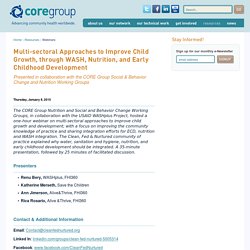
The Clean, Fed & Nurtured community of practice explained why water, sanitation and hygiene, nutrition, and early childhood development should be integrated. A 35-minute presentation, followed by 25 minutes of facilitated discussion. Presenters. Webinar010815v2.pdf. African Nations Can Help More on AIDS, Study Says.
There's an Epidemic on Trial in New York — But It's Not Ebola. Last week, an epidemic that has ravaged one of the poorest countries in the world — killing thousands of people and sickening many more — surfaced, in a way, in New York City.
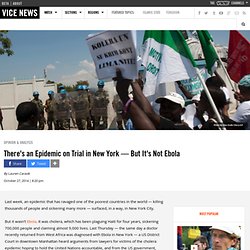
But it wasn't Ebola. It was cholera, which has been plaguing Haiti for four years, sickening 700,000 people and claiming almost 9,000 lives. 18th SuSanA meeting Stockholm, Sweden (06 September 2014) Part 1. Water Resource Organizations. Water Wiki - IWA Water Wiki - Open Access Information for the Global Water Community. This is a Guest Post by Andrew Maddocks and Paul Reig - September 05, 2014 courtesy of The World Resources Institute Blog.
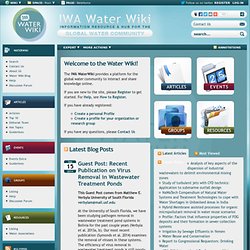
To read the original post, click here. The shale gas revolution, which began nearly 10 years ago in the United States, is poised to spread across the globe. For many countries, shale gas could strengthen energy security while cutting emissions. But unlocking this massive resource comes with a significant environmental risk: access to freshwater for drinking, agriculture, and industrial use.
Drilling and then hydraulic fracturing each shale gas well uses large volumes of water for short periods of time—between 7 million and 25 million liters (1.2 million and 6.6 million gallons). Water: policy, science, controversy, issues, hydrology. WaSH MEL Center. Pacitan, Indonesia - Open Defecation Free. WaSH MEL Center. Research-into-Use demystified at East African workshop.
At the end of June 2014, SHARE Research Consortium, WaterAid East Africa and WaterAid’s Programme Support Unit held a two-day Research-into-Use (RIU) workshop in Kampala.
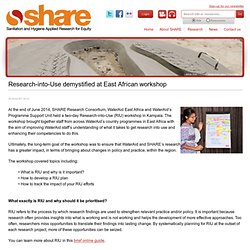
The workshop brought together staff from across WaterAid’s country programmes in East Africa with the aim of improving WaterAid staff’s understanding of what it takes to get research into use and enhancing their competencies to do this. Ultimately, the long-term goal of the workshop was to ensure that WaterAid and SHARE’s research has a greater impact, in terms of bringing about changes in policy and practice, within the region. The workshop covered topics including: • What is RIU and why is it important?
• How to develop a RIU plan • How to track the impact of your RIU efforts. Water and Sanitation in Developing Countries: Compendium of Sanitation Systems and Technologies. Unclogging Uganda's rural sanitation crisis. Sam Loewenberg One of the most devious of Walumbe’s common diseases is schistosomiasis.
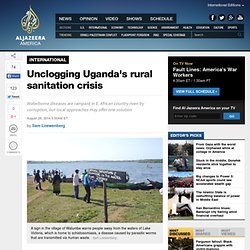
When people suffering from the disease go to the bathroom outdoors, close to Lake Victoria, tiny worms in their feces and urine called blood flukes find a host in water-dwelling snails. Africa's water: the path to universal access - interactive. With help from Sesame Street, UN urges partners to break silence on open defecation.
28 May 2014 – It is time to talk about open defecation, the United Nations declared today, launching a new campaign to end the practice and improve access to toilets and latrines for the 2.5 billion people worldwide without basic sanitation.
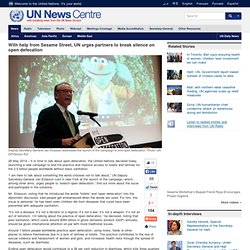
“I am here to talk about something the world chooses not to talk about,” UN Deputy Secretary-General Jan Eliasson said in new York at the launch of the campaign, which, among other aims, urges people to “search open defecation,” find out more about the issue and participate in the solutions. Mr. Eliasson, noting that he introduced the words “toilets” and “open defecation” into the diplomatic discourse, said people get embarrassed when the words are used. Interactive Map: Africa’s mixed progress on water and sanitation access. If all goes according to plan, every person in the world will have access to clean water and sanitation by 2030.
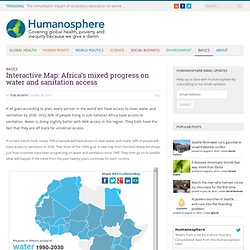
Only 30% of people living in sub-Saharan Africa have access to sanitation. Water is doing slightly better with 66% access in the region. They both have the fact that they are off track for universal access. If current trends hold, nearly 78% of people will have access to clean water and nearly 34% of people will have access to sanitation in 2030. That short of the 100% goal. Menstruation and diarrhea: Taboo topics that matter. Today is the first-ever Menstrual Hygiene Day!
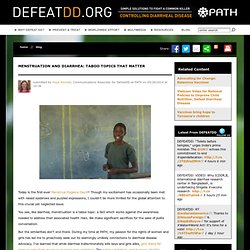
Though my excitement has occasionally been met with raised eyebrows and puzzled expressions, I couldn’t be more thrilled for the global attention to this crucial yet neglected issue. You see, like diarrhea, menstruation is a taboo topic: a fact which works against the awareness needed to address their associated health risks. We make significant sacrifices for the sake of polite conversation. But the similarities don’t end there.
Local FD is placing these this spring. Sanitation Investment Tracker (SIT) The Sanitation Investment Tracker is a suite of applications that can be used to track investment (and associated expenditure) in sanitation at household level.
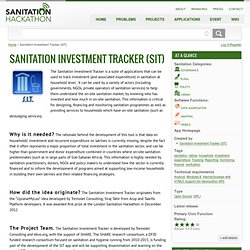
It can be used by a variety of actors (including governments, NGOs, private operators of sanitation services) to help them understand the on-site sanitation market, by knowing who has invested and how much in on-site sanitation. This information is critical for designing, financing and monitoring sanitation programmes as well as providing services to households which have on-site sanitation (such as desludging services). Why is it needed? How did the idea originate?
The Sanitation Investment Tracker originates from the “UpraiseMyLoo” idea developed by Tremolet Consulting, Siraj Tahir from Arup and Taarifa Platform developers. Water.org. Charity: water. Home - The Value of Water Coalition CampaignValue of Water Coalition. Water For People. International Decade for Action 'Water for Life' 2005-2015.
Document - United Nations: General Assembly makes progress on the human rights to water and sanitation, but only so far as the USA permits. 10. Safe Drinking Water: Science and Law. 10. Safe Drinking Water: Science and Law. 11. The Sanitary Movement and the 'Filth Theory of Disease' International Education and Training Advisor (WASH) Organizational Background CAWST is a Canadian non-profit organization focused on the principle that clean water changes lives.
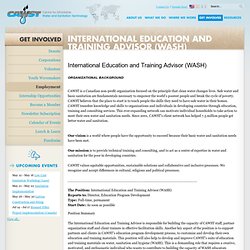
Safe water and basic sanitation are fundamentals necessary to empower the world’s poorest people and break the cycle of poverty. CAWST believes that the place to start is to teach people the skills they need to have safe water in their homes. CAWST transfers knowledge and skills to organizations and individuals in developing countries through education, training and consulting services. Publications & Resources. A year for water. The Drinkable Book - Water is Life. WASHplus Weekly: Focus on WASH and Nutrition. This issue features some of the latest studies on WASH and nutrition integration. Included are recent presentations from a USAID meeting and a global WASH conference. Other recent studies discuss the impact of improved sanitation facilities on reducing malnutrition and anemia. Also included are links to past issues of the WASH and Nutrition Literature Update.
Emergency Nutrition Network (EEN) Technical Meeting on Nutrition – Oxford, UK, 7th, 8th and 9th October 2014. 2013-SOIL-Annual-Report.pdf. Mind the Gap: Assessments of human resources in WASH in four countries — International WaterCentre. This project reviewed the current and future human resource needs of the Philippines, Sri Lanka, Papua New Guinea and PDR Laos as they strive to meet goals for water and sanitation. Project Category: Applied Research Key Areas of Work: WASH (water, sanitation and hygiene), WASH service delivery, Human resources, Capacity development, Capacity needs assessment With the International Water Association, the IWC is undertaking Human Resource Capacity assessments in the Philippines, Sri Lanka, Papua New Guinea and Lao PDR.
The IWC are working with local experts to describe the institutional context for water and sanitation services, to estimate the existing human resources in the water and sanitation sectors, to predict the capacity needed in 2015 if the MDGs are to be met, and estimate the apparent shortage in human resource capacity. Welcome to the online consultation « Rights to Water and Sanitation. The UN Special Rapporteur on the human right to safe drinking water and sanitation, Catarina de Albuquerque, is developing a Handbook to provide practical guidance to States and other stakeholders on how the rights to water and sanitation can be incorporated into law, policy, budgets, and service provision.
Please click here to access the online consultation of the draft Handbook. For more information, see our interview with the UN Special Rapporteur on the right to safe drinking water and sanitation. Q&A: How can you contribute to the Handbook through this online consultation? What: This online consultation has been designed to share the first draft of the Handbook for realising the rights to water and sanitation, and to gather comments, ideas and experience to illustrate and explain how the rights can be realised. West Virginia Water Contains Formaldehyde, Official Says. By Kiley Kroh "West Virginia Water Contains Formaldehyde, Official Says" CREDIT: AP Photo/Steve Helber.
Shelter Assessment Manager - BGL_Mahasen_Phase 3 Shelter WASH Early Recovery Detailed Assessment_Assessment Report_FINAL_18June2013.pdf. MDG Needs Assessment Tools. MDG needs assessments map out the scale of practical interventions required to meet the MDGs in a country, with special focus on infrastructure, human resources and financial requirements. The results of such assessments can form the basis for developing country-specific strategies to meet the MDGs by 2015. Moreover, they provide a framework for the transparent budgeting of public expenditures to meet the MDGs. MDG Needs Assessments aim to flip the question: From: How close can we get to the MDGs under the current constraints?
Hope for Haiti. Forum. Water Everlasting? WBG President Kim Calls for Renewed International Support to Help Haiti Overcome Cholera. Wastewater Treatment. Household_Water_Treatment_Safe_Storage_PARTICIPANT.pdf. Treatment technologies. Welcome to Africa Water, Sanitation & Hygiene. Professional WASH networking and NGO coordination in Uganda. Home - SWA. SHARE Research Newsletter - March 2014. City-wide sanitation project publishes situational analyses of its four focus cities. WASH Nutrition Literature Updates - March 2014. BILLS-111s624rfh. WSPortal: health through water. Patel College of Global Sustainability. International Water Management Institute (IWMI)
World Water Council - World Water Council.
Acceptance and Use of Eight Arsenic-Safe Drinking Water Options in Bangladesh. The integrated behavioural model for water, sanitation, and hygiene: a systematic review of behavioural models and a framework for designing and evaluating behaviour change interventions in infrastructure-restricted settings. 1471-2458-13-1015.pdf. How Access to Water and Sanitation Helps Women and Girls.